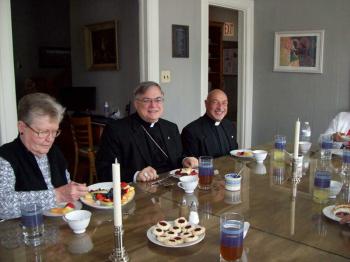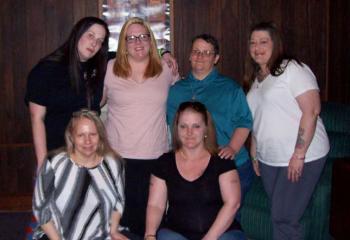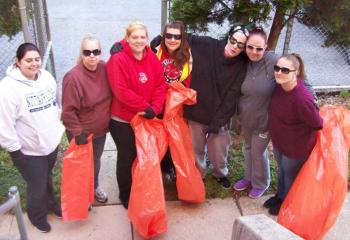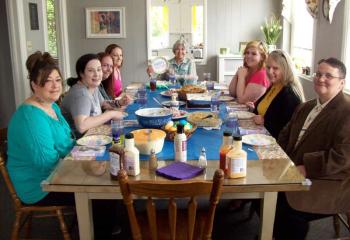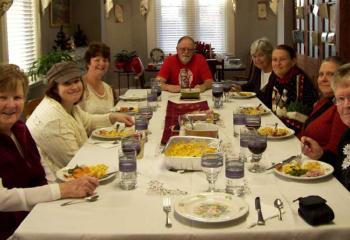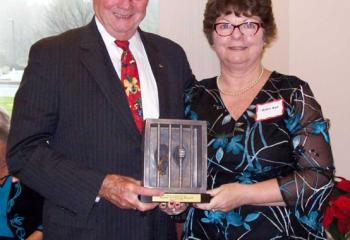By TAMI QUIGLEY
Staff writer
Clare of Assisi House, Reading is a beacon of hope and caring as the only transitional residential facility in Berks County for women just released from incarceration. It was established to give women solutions to the challenging obstacles of rebuilding their lives – as the tagline on its website states, “Putting the Pieces of Life Back Together – Serving the Needs of Women Upon Release from Prison.”
The house was founded in 2014 by Robin Ball, who later recruited Franciscan Sisters Eileen Doherty, associate director; and the late Kathleen McMullin, project director, who died last year. These early founders are all parishioners of St. Benedict, Mohnton.
Ball, executive director and founder, chose the name because, like St. Francis, St. Clare’s mission was to serve the poor. St. Francis and St. Clare were a reflection of Christ. Since this house was to be for women, it seemed only natural to name it after a woman who was so dedicated to helping others.
“I had a strong inner knowing,” said Ball, who had been mentoring a woman through Berks County Prison’s One on One program when she had the idea.
“I am deeply grateful for the work of Clare of Assisi House and edified by the work of the staff and volunteers who offer a safe and caring transition to women who are transitioning from the corrections system to meaningful employment in the community,” said Bishop Alfred Schlert, who visited the facility May 2 for a tour, luncheon and to meet staff and residents.
“It is yet another example of the good work that is done every day in the name of Christ, and that is so essential in our society.”
Also visiting that day were Father Thomas Bortz, pastor of St. Ignatius Loyola, Sinking Spring; Jesuit Father Thomas Kuller of the Jesuit Center, Wernersville, a member of the house’s board of directors; and Paul Acampora, secretary of the Diocesan Secretariat for Stewardship and Development.
The women have a morning meditation each day. Each woman is assigned a morning and they choose a spiritual reading to share and discuss.
“We provide the women with a list of churches in the area for all denominations,” said Pamela Mills, administrative assistant.
“We have several faith-based groups that come in from time to time for fellowship with the women or conduct a Bible study.
“For the Catholics, ladies from the Legion of Mary from St. Ignatius Loyola, Sinking Spring come in once a month to meet with the women. They also have access to the sisters that are associated with Clare House. The women have participated in church services at St. Catharine of Siena, Reading and St. Benedict.”
Mills explained the house did not start receiving residents until 2017: “It took three years to secure a property, prepare it, and find the staffing and volunteers needed.”
Located at 325 N. 12th St., Reading, Clare House is the former Mary’s Shelter. It was leased from St. Catharine of Siena, “but in June 2018 we purchased the building from the Diocese. The purchase included the building we were occupying – the old convent – the old St. Mary’s School and playground,” Mills said.
Ball and Mills said the mission of the 12-bed house is to provide transitional residential services and life skills training for nonviolent women with a history of domestic violence, substance abuse and/or prostitution, who are coming out of prison and are in need of a safe and sober living environment that will encourage and support each resident in her attempt toward self-sufficiency and independent living.
Clare House’s main goal is to reduce recidivism, assisting the resident to find gainful employment that positively contributes to the economy because now she is a taxpaying member of the community, reduce crime and increase safety in the community.
Each resident is given a private bedroom, hygiene products and clothing from Clare’s Closet.
The women receive skills training, workforce development, resume writing assistance, financial and budgeting training, case management services, nurturing parenting classes, addiction support including 12-step meeting, and other skills training to assist them as they work on “putting the pieces of their life back together.”
“The Clare of Assisi House is such an amazing place. It is an opportunity to be in a stable, beautiful and supportive environment,” said resident Autumn Yeager.
“The staff is so supportive, and they all encourage us to be the best that we can be while they try to help us integrate back into society. This house brings people together. It isn’t biased on race, religion or background. We all consider ourselves a family. We call ourselves the Clare House Sisters. We are here creating bonds that will help us better ourselves, support each together and will last a lifetime.”
“I am very grateful for the Clare of Assisi House for a beautiful, safe and clean place to live,” said resident Lisa Painter.
“After so much heartache, devastation and loss through many bad choices and childhood wounds, my life headed down a very dark and lonely road that I am blessed to even be alive
“So to have a place to continue to heal and to thrive on the journey that started once I truly surrendered during my incarceration in Lehigh County and continued into Muncy State Prison is so important. I didn’t have anyone or place to go, and Clare of Assisi House took a chance on me and gave me the start and safety I needed to have on the outside.
“And I have taken that and ran with it full force into recovery and mental health, building a firm foundation on Jesus and sobriety. There is no way that I could have done any of this without a safe place to live. I thank God every day for his grace and mercy, and for the Clare House for giving me a chance at life.”
In the first two years of operations, the house has served 15 women. The average stay is three months to a year. All the women are/were employed or furthering their education. All the employed residents, supervised by staff and a financial representative, created a budget toward paying back debt, pay their current bills and manage their money in a more constructive manner. Two of 15 graduated from the program. The remaining women are still working toward this goal.
Clare House uses community resources in the form of grants, including funding from the Bishop’s Annual Appeal, the Poverty Relief Grant, annual fundraising, and volunteer efforts and donations.
“We are always in need of funding for operations and volunteers,” Ball and Mills said.
Clare House’s website lists volunteer opportunities and in-kind donations needed. There is an open position on the board for a CPA.
The house has a committed fundraising committee that dedicates numerous hours to making the house’s events a success.
An upcoming fundraising event, “Autumn in Italy” with Chef Brennan, is slated for Thursday, Sept. 12 from 6:30 to 9:30 p.m. at Panevino Restaurant, 25 N. Second St., Reading.
The annual Holiday Brunch will be Sunday, Dec. 8 at 11:30 a.m. at the McGlinn Conference and Spirituality Center, 460 Bernardine St., Reading.
Clare House is a place of building trust, new skills, sister-to-sister relationships and courage of the journey. It could not have a better name. As Clare prays, “God loves you with a tender love.”
For more information, or to volunteer or donate, contact Robin Ball, 484-869-5483, [email protected]; or visit www.clareofassisihouse.org and their Facebook page.



